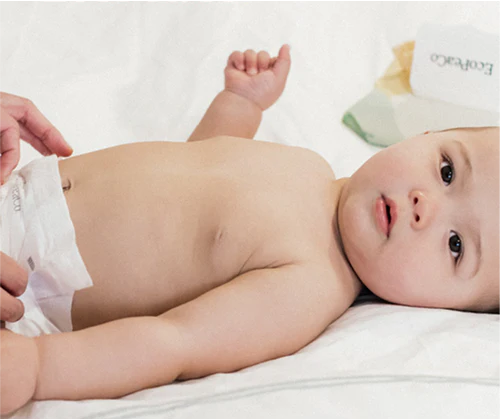Newborn Diaper Rash
Diaper rash is one of the most common baby skin problems, and mostly occurs between 9 to 12 months of age, but can happen anytime your child wears a diaper.
By definition, diaper rash is a bacterial infection that is usually short-lived and can be cured with home treatments like creams or ointments. The physical signs of diaper rash are red, scaly, and itchy skin around your baby’s bottom.
Diaper Rash Causes
There are two main types of diaper rash: rashes that are caused or worsened by diapers or rashes that are unrelated to diaper use. Common diaper rash causes include:
- Irritated Skin - When skin gets chafed as a result of tight-fitting clothes that rub against the skin, diaper rash can form. Babies with sensitive skin, atopic dermatitis, or seborrheic dermatitis are more likely to suffer from diaper rash.
- Yeast infections - Since diapers often get warm and moist, the skin around the area is more prone to bacteria that cause yeast infections. You can find diaper rashes around the creases of the skin, usually appearing as small red bumps.
- Allergies - Your baby's skin may react to new products such as baby wipes, detergents, and new types of diapers, soaps, and lotions. Check your products and make sure they are baby-friendly before putting anything on your child’s skin.
- Wet or Soiled Diapers - Leaving a dirty diaper on for too long can cause your baby’s tender skin to break out into a rash, especially if they are having bowel movements like diarrhea. Check and change your baby’s diaper regularly.
Diaper Rash Symptoms
Look for these symptoms in the diaper area to assess if diaper rash is forming on your baby’s skin:
- Red, irritated patches
- Skin that is warm to the touch
- Discomfort and/or crying, especially during diaper changes
- Sores in the diaper area

How to Treat & Prevent Newborn Diaper Rash
Thankfully, diaper rash is fairly easy to treat and prevent with just a few simple tips and remedies. Whatever you do, make sure the diaper area is always kept as dry as possible, well-ventilated, and clean.
Change Diapers Often. Keep an eye out for how long diapers have been on the skin and change accordingly. Make sure that soiled or wet diapers are changed immediately.
Use Warm Water. Rinse your baby’s bottom with warm water during every diaper change. You can do this with a sink, tub, or water bottle. A warm cloth or baby wipes without alcohol or fragrance can help during this process, as well as letting the area air dry.
Use Creams and Ointments Regularly. Petroleum and zinc oxide are great to use after each diaper change and be purchased from your local drugstore.
Let Your Baby’s Bum Be Free. Giving your baby’s bottom more time without a diaper is a great way to let it dry naturally. If you’re worried about accidents, using a large towel is perfect for playtime!
Avoid Over-Tightening Diapers. Keep your baby’s diaper secure, but not too tight. Restrictive diapers rub against the skin and prevent a natural flow of air.
Home Remedies for Diaper Rash
If you want to try your hand at concocting at-home remedies, here are a few popular options:
Make Your Own Diaper Rash Cream - With simple ingredients found at home, you can make rash creams like the one found on Mommypotamus blog. The balm uses olive oil, shea butter, coconut oil (an antifungal that is great for yeast diaper rash), and zinc oxide.
Olive Oil - Did you know that olive oil contains anti-inflammatory and antimicrobial properties? It can be used in place of mild cleansers like Cetaphil and it’s recommended for irritant dermatitis diaper rash.
Cornstarch - Instead of talcum powder, try cornstarch. You can keep a jar of it near your diaper-changing area, just make sure it stays out of your baby’s lungs!
Apple Cider Vinegar - Laura of Clean Chef, Messy Mom recommends adding a cup of apple cider vinegar to your baby’s bath water to get rid of diaper rash quickly. Published research shows that ACV slows the growth of candida (yeasts that can lead to fungal infections).
Coconut Oil - Coconut oil has been shown to have strong antifungal properties and is especially helpful for diaper rash caused by yeast. As an added bonus, it is naturally soothing and hydrating.

When to See a Doctor
In certain circumstances, when symptoms persist or get worse after home treatment for more than 3-4 days, it may be time to see a doctor. Other signs it's time to seek professional care include:
When you notice your baby with a red and uncomfortable diaper rash, it can be concerning for you as a parent. Fortunately, diaper rash is easily treatable at home (as long as you have the right tools!).



